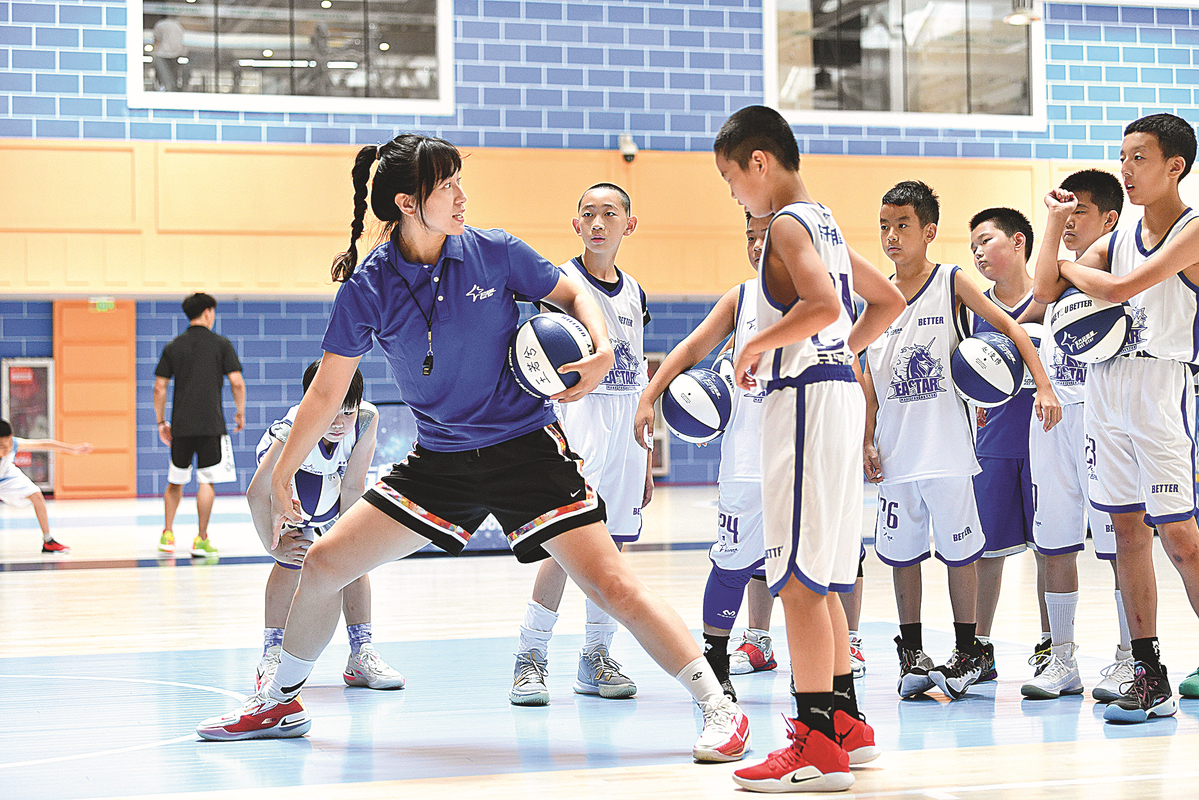New legislation better promotes sports

A basketball coach of East Star gives instructions to her trainees at a branch in Beijing. [Provided to China Daily]
With additional legal support for physical education, anti-doping programs and athlete welfare, amendments to China's sports law are expected to help the country realize development ambitions in the field.
The revision of the Law on Physical Culture and Sports, based on the inaugural version enacted in 1995, was passed on Friday at a session of the National People's Congress Standing Committee, China's top legislature, and will take effect from Jan 1, 2023.
As China marches on to build itself into a global sporting power, the amendment to the decades-old law has been applauded by lawmakers, notable figures from the sports community and legal experts for addressing a wide range of urgent issues, such as guaranteeing enough exercise by children, protecting athletes' rights and interests, developing the sports industry and fighting against doping, with stronger and more specific legal support.
"It's been over 20 years since the law was enacted. It has been lagging far behind the need to develop the sports sector in our country," said Guo Linmao, an official from the Legislative Affairs Commission of the NPC Standing Committee.
"The fast evolving sports business, people's growing demand for sports participation, and the need to settle disputes in the sports sector and reform the sports governing system all require more comprehensive and competent legal protections in line with international practices," Guo said.
The revision includes 12 chapters and 122 articles, up from 54 articles in the 1995 version, with more detailed legal responsibilities and rights added for relevant individuals and organizations to safeguard their rights while resolving disputes, thus making the law more enforceable, according to Chu Bo, director of the policy and law department of the General Administration of Sport of China.
"Only by building a robust and mandatory legal framework can we address issues that have more often hindered the development of the sports sector," Chu said.
"The revision adopted a lot of specific regulations and forward-looking principles to support sports development at present and in the future."
A highlight of the amendments is an article requiring that students' performance in sports competitions and activities on campus should be included as a major part of their overall assessment in schools, and that time set aside for PE classes should not be taken over by other academic subjects. Each student should be guaranteed at least an hour of exercise a day at school.
The fight against the use of performance-enhancing drugs was highlighted as a new chapter with details on the responsibilities of sports governing bodies, health authorities and educational departments at all levels to act aggressively against the use, and supply of performance-enhancing drugs.
Violations of anti-doping rules will trigger severe punishments, either for athletes, coaches or sports officials found guilty, including fines, bans, administrative penalties and up to three years' imprisonment once the conduct is judged as a criminal offense.
With China hosting more international sporting events and its athletes competing all around the world, the development of a transparent and independent sports arbitration system, as outlined in the amended law, is also a crucial complement to legal support, said Wang Hanling, a researcher with the Institute of International Law of Chinese Academy of Social Sciences.
"The new chapter on sports arbitration in the revised law has defined the scope of sports arbitration in China and has clarified rights and obligations of governmental departments at all levels, sports organizations and third-party arbitrators for building a sound system to hear, review and settle dispute cases in the sector, which has been in urgent need," he said.
- Top legislature schedules standing committee session for late February
- China's top legislator meets with Uruguayan president
- Senior legislator surveys Anhui on formulating outline of provincial 15th Five-Year Plan
- China's top legislator meets with British PM
- NPC deputies see more engagement with top court



